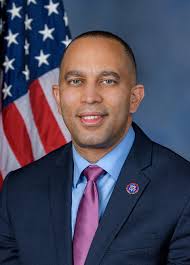
Introduction
Hakeem Jeffries, an influential figure in the Democratic Party, has recently garnered significant attention as he leads the House Democrats in the U.S. Congress. As the first African American leader of the party in the House, Jeffries’ role is crucial in shaping legislative agendas and responding to challenges posed by the opposition. His leadership is especially significant in the current political climate, where party dynamics can sway major legislative outcomes.
Background and Political Career
Born in Brooklyn, New York, in 1970, Jeffries attended Binghamton University and later received his law degree from New York University. His political journey began when he was elected to the New York State Assembly in 2006, where he quickly established himself as a leading voice on issues concerning social justice and economic equity. In 2012, he won a seat in the U.S. House of Representatives, representing New York’s 8th congressional district.
Leadership in the House
Jeffries was elected as House Minority Leader on January 11, 2023, succeeding Nancy Pelosi. His appointment comes during a challenging time for the Democratic Party, which faces a Republican-controlled House. Jeffries aims to unify the party around key issues such as healthcare, climate change, and civil rights, while also focusing on grassroots engagement and outreach to diverse constituents. Under his leadership, the Democrats plan to capitalize on their strengths and counter the Republicans’ legislative moves.
Recent Developments
In recent months, Jeffries has been vocal about concerns over Republican proposals that could adversely affect Americans, including healthcare reform and economic policies. He has also articulated the Democratic perspective on critical state issues, such as gun control and reproductive rights, emphasizing the party’s commitment to defending these values. Jeffries has aggressively sought bipartisan support on certain initiatives, aiming to find common ground amidst political polarization.
Conclusion
As Hakeem Jeffries continues to lead the Democratic Party in the House, his influence is expected to grow alongside ongoing national discussions on key issues. His leadership style, marked by pragmatism and inclusivity, could redefine the party’s approach in the face of adversity. The significance of his role cannot be overstated, given the challenges ahead and the potential impact on American policy and society. Observers are keenly watching to see how Jeffries will navigate the complexities of leadership and steer the Democratic agenda moving forward.
You may also like

Understanding the Current Political Landscape in the UK

The UKIP Party: Recent Developments and Future Outlook

Boris Johnson: A Look at His Current Political Landscape
SEARCH
LAST NEWS
- Remembering Wendy Richard: The Promise to Co-Star Natalie Cassidy
- How Did Anglian Water Achieve an ‘Essentials’ Rating for Mental Health Accessibility?
- Shai Hope Leads West Indies in T20 World Cup Clash Against South Africa
- What We Know About Weston McKennie: Future at Juventus and Past at Leeds
- What We Know About the Upcoming Live Nation Antitrust Trial